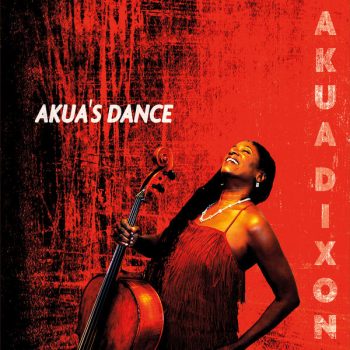 (4 / 5)
(4 / 5)
Hmmmm… would I enjoy an entire album where cello is mostly the main instrument – and that’s NOT a classical record either? On paper, probably not. But after a few tracks in to the new album from US cellist and pioneering artist Akua Dixon, I have to say it is a truly captivating piece of work with many layers.
Most would “file under jazz,” but there’s a lot more to it than jazz. The 10 tracks which run to 55 minutes in total, encompass exquisite balladry, the music’s deepest roots in African and African-American culture, and instrumental pieces gleaned from Dixon’s opera-in-progress. The album follows her last release; the 2015 critically acclaimed self-titled record, a string-centric recording that featured her “in a sectional way.” On this one she is very much “out front” with the rhythm section. Two rhythm sections, to be precise.
Seven of the 10 tracks feature her quartet with guitarist Freddie Bryant, bassist Kenny Davis, and drummer Victor Lewis, Dixon performing on the baritone violin. It’s an instrument with the same tuning as her cello, but a larger, deeper sound. She was seeking more power on some cuts, so this instrument was her weapon of choice to deliver that.
On three pieces, Lewis and Dixon (on cello) are joined by guitar ace Russell Malone and bass legend Ron Carter, with whom she first performed some four decades ago on Archie Shepp’s “The Cry of My People” released in 1972 by the Impulse! label. But Akua had never had a chance to work with Carter playing her music. Until now.
The album opens with Dixon’s “I Dream a Dream,” a piece she repurposed from her opera based on the life of 19th-century New Orleans voodoo queen Marie Laveau. The dance rhythm has roots in many parts of Africa. “Akua’s Dance” is another tune drawn from the opera, and its groove was inspired by Dixon’s gigs performing for dancers at African-American socials. Abbey Lincoln’s “Throw It Away,” has become a standard in recent years and is the sole outing for Akua’s pleasing vocal.
Closing the album are several pieces that embody the sacred and secular sides of African-American culture. The infectious twist to Sade’s “The Sweetest Taboo,” which for me is a tad too long and repetitive at five minutes and 45 seconds long, precedes the penultimate cut, the Negro spiritual “I’m Gonna Tell God All of My Troubles” arranged by Freddie Bryant. This is the sparkling gem among a set of consistently strong and distinctive pieces. The baritone violin delivers powerful bottom end moodiness on this outstanding cut.
New York born and based Akua, graduated from the prestigious “Fame” High School of the Performing Arts, and then studied at the Manhattan School of Music. Her post-graduation gig in the pit band at the Apollo Theatre was for her, an essential proving ground. With the doors of most symphony orchestras closed to African-American musicians and few women got the gig, Akua found a home in the Symphony of the New World, where she experienced the Ellingtonian-epiphany that led her to jazz. She focused on “the secrets of improvising,” and that apprenticeship has served her well, based upon her inventiveness and control she displays across this massively impressive album.
In the early 1970s, she served as director of new music for the String Reunion, a 30-piece orchestra founded by Noel Pointer, and at the same time launched her own string quartet, Quartette Indigo. A founding member of the Max Roach Double Quartet in the early 1980s, Akua Dixon had honed her rhythmic drive backing the likes of James Brown.
This is an album that is really difficult to sum up to adequately describe in words to do it, and the graft and craft invested in it, justice. The music must speak for itself. It might be a ‘Marmite moment’ for some, but for most it should inspire and stimulate, stoking the fires of inner most passions and emotions, and at the very least; greatly impress for the sheer quality of the musicianship and pushing of the jazz envelope. Bravo.
By Christopher Weston
 (1 / 5) ‘Dull Zone’
(1 / 5) ‘Dull Zone’ (2 / 5) ‘OK Zone’
(2 / 5) ‘OK Zone’ (3 / 5) ‘Decent Zone’
(3 / 5) ‘Decent Zone’ (4 / 5) ‘Super Zone’
(4 / 5) ‘Super Zone’ (5 / 5) ‘Awesome Zone’
(5 / 5) ‘Awesome Zone’





